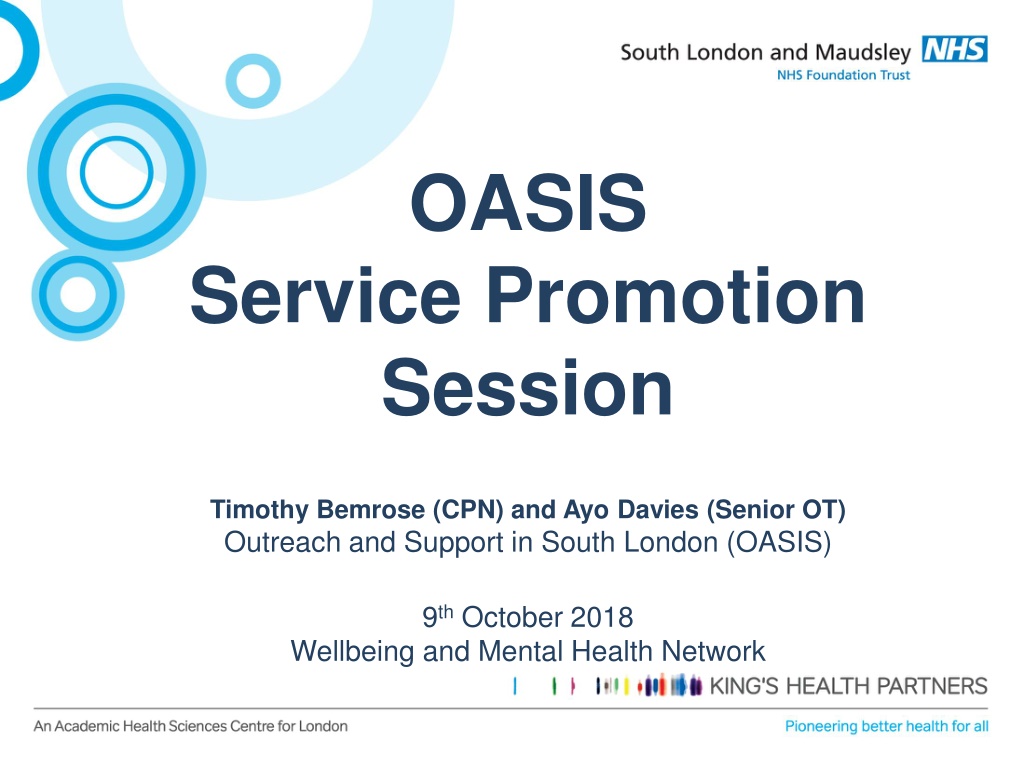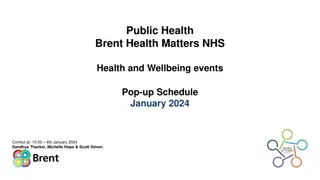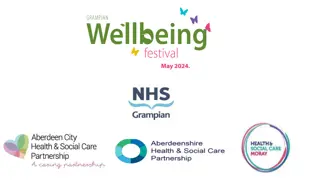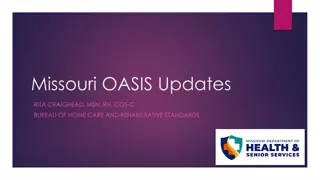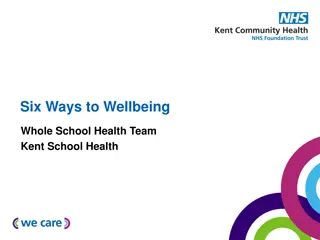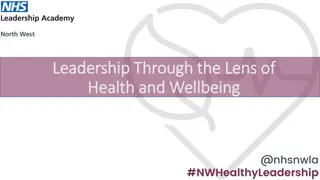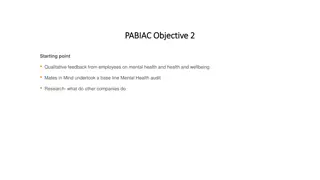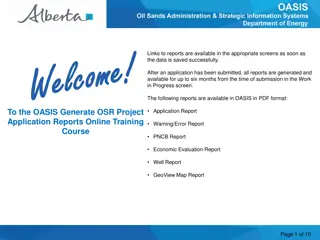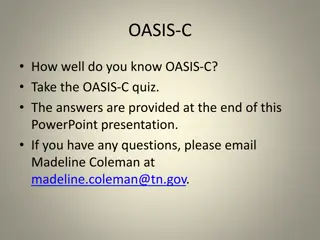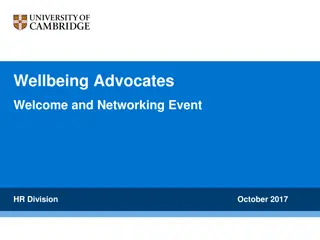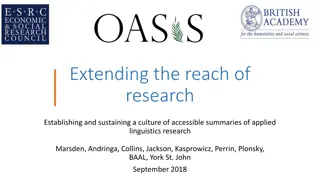Understanding Mental Health and Wellbeing: OASIS Service Promotion Session
This session by Timothy Bemrose and Ayo Davies from OASIS in South London aims to increase awareness of early warning signs of mental health difficulties, discuss who can benefit from their services, and highlight the impact of mental health problems like anxiety and stress. The service, comprising Clinical Psychologists, Occupational Therapists, Nurses, and Doctors, focuses on improving wellbeing and helping individuals reach their potential.
Download Presentation

Please find below an Image/Link to download the presentation.
The content on the website is provided AS IS for your information and personal use only. It may not be sold, licensed, or shared on other websites without obtaining consent from the author. Download presentation by click this link. If you encounter any issues during the download, it is possible that the publisher has removed the file from their server.
E N D
Presentation Transcript
OASIS Service Promotion Session Timothy Bemrose (CPN) and Ayo Davies (Senior OT) Outreach and Support in South London (OASIS) 9th October 2018 Wellbeing and Mental Health Network 1
Objectives: To increase awareness of early warning signs of mental health difficulties To talk about OASIS - who might benefit from our service and how to refer
Who are we? A health service offering assessment and intervention Aimed at improving well-being and reducing the risk of symptoms worsening Helping people get their lives back on track and reach their potential Our service is made up of Clinical Psychologists, Occupational Therapists, Nurses and Doctors
Mental health problems Mental health problems are very common and there are lots of different types. About a quarter of the population experience some kind of mental health problem in any one year. Anxiety and depression are the most common problems (around 1 in 10 people affected).
What things can affect our mental health?
What is anxiety? A normal response to situations that we see as threatening Characterised by feelings of worry, nervousness, fear or unease about with an uncertain outcome something When we perceive a threat, our fight or flight response is triggered and we experience the physical symptoms of anxiety
What is stress? Stress is your body s reaction (emotional & physical) to a stressor or a number of stressors A stressor is quite simply anything that adds pressure, worry or physical problems We tend to feel stressed when the demands we face seem to outweigh ability to cope our
Stress bucket The bucket represents how able we are to deal with stress. The size of the bucket is different for each of us. What may cause one person great stress may not cause another person stress. Each day water (stress) drips into our bucket. Too much water will make our bucket overflow. We need to make holes in our bucket to relieve our stress. Holes represent the coping strategies we have.
Early warning signs: stress Low energy / tiredness Frequent colds / illness Trouble concentrating Worrying Unable to switch off Feeling overwhelmed or unable to cope Headaches Feeling bad about yourself Difficulty sleeping Avoiding situations or people Feeling frustrated/ irritable Trouble relaxing Tense muscles Upset stomach / change in appetite
What is at risk mental state (ARMS)?
Early warning signs: at risk mental state Struggling to cope at school, college or work Constantly thinking about particular ideas or beliefs Preferring to spend time alone, away from family and friends Unusual experiences like seeing or hearing things that other people can t Feeling anxious, irritable or depressed Feeling that things and people seem strange or unreal Changes in sleeping and eating patterns Confused or muddled thinking
Self-help strategies Increasing activity Lifestyle balance Setting goals Problem solving Challenging unhelpful or negative thoughts Managing worries
Get active, feel good Increased activity Greater energy and motivation Feel hopeful, more confident, less guilty Feel more positive
Lifestyle balance 1) Routine 2) Pleasurable 3) Necessary
Problem solving 1. Identify the problem, break it down if needed 2. List ALL the possible solutions 3. Consider the pros and cons of each solution 4. Select one to try out 5. Plan how you are going to do it 6. Put plan into action 7. Review
Thinking differently Some useful questions to ask yourself: Is there another way of looking at this? Would somebody else think my thoughts were based on facts? Is there any evidence that supports or goes against this thought? Have I dealt with similar situations in the past? Am I falling into an unhelpful thinking trap? Is thinking this way helping my confidence? What would be a more fair and realistic thought?
The 4 Us of worry We often worry about things that are: Unimportant Unlikely Uncertain Uncontrollable
Worry time Involves postponing worries and scheduling in 20 minute period of our day where we allow ourselves to worry When worries come during the day, we simply write them down and come back to them in our allocated worry time This helps us limit the amount of time we spend worrying in our day When we re-visit our worries we might no longer feel we need to worry about them, or we can look at them in a more rational manner and deal more effectively with the worry
Referring to OASIS Distress and disturbances can be precursors to serious mental health problems Unusual or anomalous experiences may mean a person is at risk of psychosis Evidence based intervention can reduce untreated psychosis and delay or even prevent onset We provide a two year package of care in helping people to move forward in their lives
How do we offer help? Detailed assessment within 2 weeks of referral Psychological therapy Medical consultation and treatment Practical advice around issues such as housing and finances Support in taking up new opportunities in study or work.
How to contact us: Please do not hesitate to contact us should you have any queries at all. We are more than happy to discuss individual cases To make referrals, please contact us on: Telephone: 020 3228 7200 oasisreferrals@slam.nhs.uk OASIS 190 KENNINGTON LANE SE11 5DL
